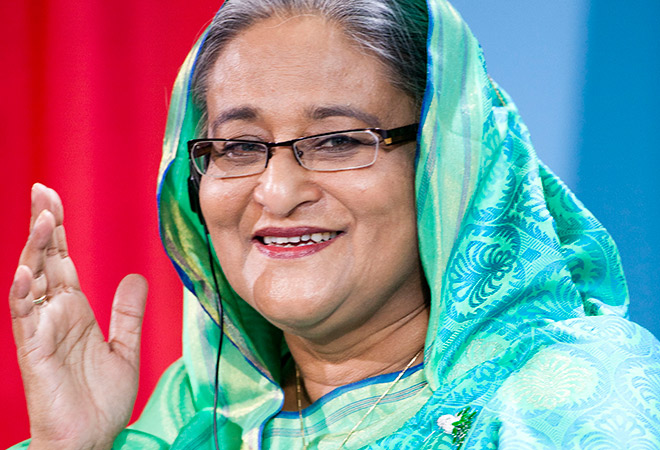
Source: Carsten Koall / Getty Images
The results of the 11th parliamentary election in Bangladesh were known even before the first vote was cast last Sunday or the first ballot was counted in the evening on the same day. It was only a question of how many seats would Sheikh Hasina Wajed’s Awami League tote up to prove its point that it faces no opposition worth its name.
In the event, the Awami League seems to have decided to crush all opposition and reduce its main rival, the Bangladesh Nationalist Party, to a miserable stump of its previous self. The Dhaka Tribune says the Awami League and its (marginal) allies have garnered at least 82 per cent of the votes, leaving a measly 16 per cent to the opposition alliance led by the BNP.
Once the final results are out, Bangladesh will have a Parliament almost entirely occupied by the Awami League; the opposition’s presence, if it cares to register it, will be barely noticeable. Sheikh Hasina, with a third straight victory, has emerged as the Supreme Leader, unchallenged and unvanquished.
For all practical purposes Bangladesh is now a single-party state with inconsequential parties keeping alive the country’s constitutional description as a multiparty democracy.
Sheikh Hasina Wajed has achieved what her father Sheikh Mujibur Rahman aspired for. Unlike him, she has skilfully, methodically and strategically defenestrated potential challengers within the Awami League and defanged those in rival parties.
With Begum Khaleda Zia packed off to jail on corruption charges and her son forced to live in exile in London (he faces imprisonment for life if he were to return) the BNP, out of power for a decade, is in disarray. Its ally, the Jamaat-e-Islami, has been barred from contesting elections and its top leaders have been sent to the gallows for 1971 war crimes. The rest who claim to oppose tbe Awami League are, as has been demonstrated, irrelevant.
Equally irrelevant are those who accuse the Awami League of silencing dissent and organising an election that was neither free nor fair.
Sheikh Hasina has never pretended, leave alone tried, to be tolerant of contenders for power; just as Khaleda Zia was determined, while in power, to destroy the Awami League and its leadership root and branch.
To her credit, Sheikh Hasina has provided political stability and palpable change for the better, converting what the world derided as a ‘basket case’ into a thriving economy. Per capita income has increased remarkably and real poverty has been halved in a country where wretched poverty was endemic.
Beyond that there is little to be said in her favour. The BNP thrived on the staid but vile Islamism of the Jamaat-e-Islami. The Awami League has swamped that Islamism with its own preferred choice by aligning with the Hefazatul Islam whose bellicosity is more in tune with the radical belligerence of our times. True, it stops short of promoting jihadist violence, but that’s for the moment.
Much has been said and written of Sheikh Hasina’s own war on terror through targeted killings and alleged disappearances. There is little evidence to suggest that has halted Bangladesh’s slide towards violent radicalism.
The ghastly Gulshan attack is only one example, there are many others. Sheikh Hasina and her Government have sent out mixed signals by pandering to Islamists in between making a show of punishing them. To use a cliche, she is not averse to running with the hare and hunting with the hounds.
Critics point out how free thinking intellectuals like Abhijit Ray have been silenced through the expedient means of killing them. None of the killers of bloggers has been brought to book. A new law has tightened the screws on media and the country’s rules governing the Internet have been amended to curb freedom. Wellknown journalists have been harrased and arrested on trumped up charges. Minority rights have been more honoured in the breach than in the observance.
But all this is overshadowed by Sheikh Hasina’s massive victory. The opposition can keep demanding fresh elections but that will never happen. It is unlikely that either the US or the EU will strike a particularly harsh posture on the quality of Sunday’s election and the steamrolling of the opposition as they did in 2014 when BNP boycotted the polls. In these past five years the emergence of ‘strong’ and bully leaders in democracies has become the new normal. That Bangladesh now has 11 parliamentary elections to boast is by itself enough to blunt criticism of the quality of the latest elections.
For India, the foregone outcome of the election is good news. Irrespective of the party in power in Delhi, Dhaka has been sensitive to Indian concerns with Sheikh Hasina at the helm in Bangladesh.
A disruption in continuity would have been cause for concern given India’s unhappy experience with the BNP in power. In a sense, after bad tidings from Nepal, both Maldives and Bangladesh elections have fetched good cheer for India.
However, that does not diminish the other reason for concern: the looming shadow of China. Chinese investments in Bangladesh, including those by Chinese companies, add up to $42 billion as per one estimate. This can only increase in the coming months as an ambitious Supreme Leader, now 71, looks for a lasting legacy by way of impressive infrastructure which would bear testimony to her claim that Bangladeshis have voted for development and progress. China would be more than willing to oblige.
Source: ORF
